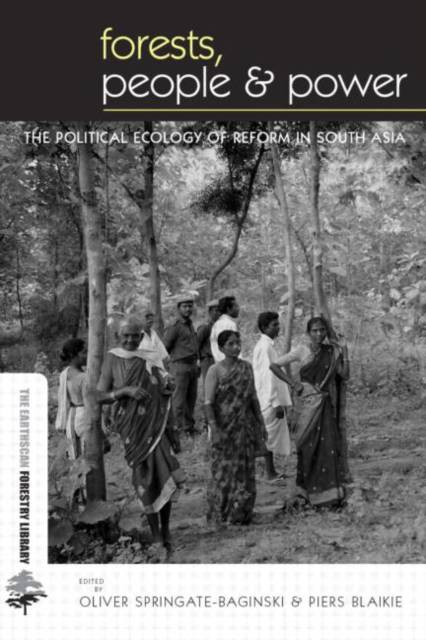
- Retrait gratuit dans votre magasin Club
- 7.000.000 titres dans notre catalogue
- Payer en toute sécurité
- Toujours un magasin près de chez vous
- Retrait gratuit dans votre magasin Club
- 7.000.0000 titres dans notre catalogue
- Payer en toute sécurité
- Toujours un magasin près de chez vous
Forests People and Power
The Political Ecology of Reform in South Asia
290,45 €
+ 580 points
Description
�With tens of millions of hectares and hundreds of millions of lives in the balance, the debate over who should control South Asia�s forests is of tremendous political significance. This book provides an insightful and thorough assessment of important forest management transitions currently underway.� MARK POFFENBERGER, EXECUTIVE DIRECTOR OF COMMUNITY FORESTRY INTERNATIONAL �The contributions in this volume not only breathe life into the fi eld of writing and analysis related to forests, they do so on the strength of extraordinarily insightful research. Kudos to Springate-Baginski and Blaikie for providing us with a set of thoroughly researched, provocative studies that should be required reading not only for those interested in community forestry in south Asia, but in resource governance anywhere.� ARUN AGRAWAL, ASSOCIATE PROFESSOR OF NATURAL RESOURCES & ENVIRONMENT, UNIVERSITY OF MICHIGAN, USA �Makes a significant contribution to theory and practice of participatory forest management.� YAM MALLA, EXECUTIVE DIRECTOR, REGIONAL COMMUNITY FORESTRY TRAINING CENTER FOR ASIA AND THE PACIFIC, BANGKOK �This excellent and timely book provides thought-provoking insights to the issues of power and politics in forestry and the difficulties of transforming age-old structures that circumscribe the access of the poor to forests and their resources; it challenges our assumptions of the benefits of participatory forest management and the role of forestry in poverty reduction. It should be of interest to policy-makers and to all those who have been involved with the struggle of transforming forestry over the decades.� DR MARY HOBLEY, HOBLEY SHIELDS ASSOCIATES (NATURAL RESOURCE MANAGEMENT AND PLANNING CONSULTANCY) �A rare combination of extensive field study, social science insights and policy studies � will be of immense value� DR N. C. SAXENA, MEMBER OF NATIONAL ADVISORY COUNCIL, GOVERNMENT OF INDIA In recent decades �participatory� approaches to forest management have been introduced around the world. This book assesses their implementation in the highly politicized environments of India and Nepal. The authors critically examine the policy, implementation processes and causal factors affecting livelihood impacts. Considering narratives and field practice, with data from over 60 study villages and over 1000 household interviews, the book demonstrates why particular field outcomes have occurred and why policy reform often proves so difficult. Research findings on which the book is based are already influencing policy in India and Nepal, and the research and analysis have great relevance to forestry management in a wide range of countries. Published with DFID.
Spécifications
Parties prenantes
- Editeur:
Contenu
- Nombre de pages :
- 416
- Langue:
- Anglais
- Collection :
Caractéristiques
- EAN:
- 9781844073474
- Date de parution :
- 29-06-07
- Format:
- Livre relié
- Format numérique:
- Genaaid
- Dimensions :
- 179 mm x 241 mm
- Poids :
- 834 g

Les avis
Nous publions uniquement les avis qui respectent les conditions requises. Consultez nos conditions pour les avis.





